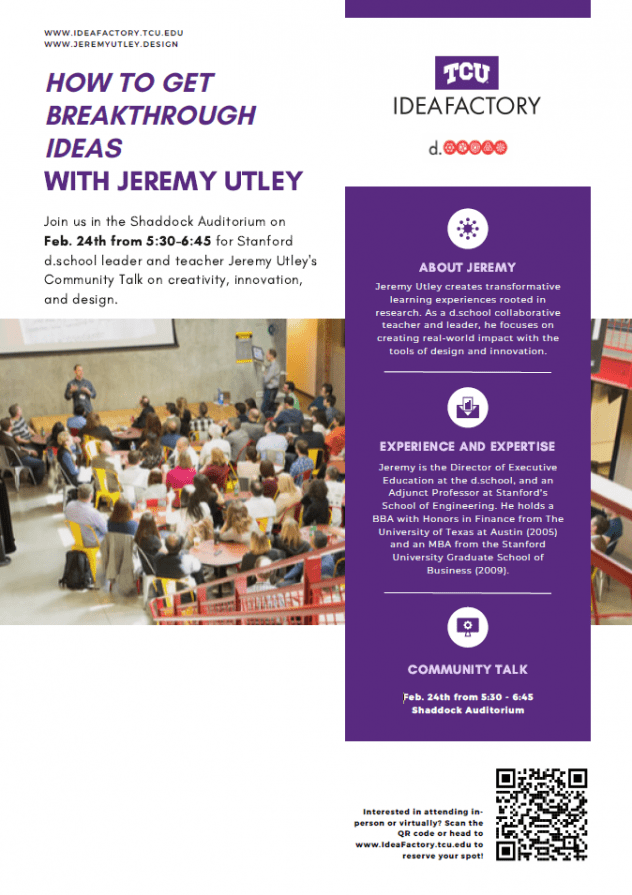Jeremy Utley
Interviewed by Alan Sanchez
Written by Benjamin Camacho
Topics of Interest: Design Thinking, Creativity, Idea Generation, Hasso Plattner Institute of Design at Stanford, IdeaFactory
For more about Jeremy Utley, idea generation, creative and design thinking, check out his awesome blog at jeremyutley.design. Looking for ways to get your creative thinking or ideaflow going? Subscribe and listen to Jeremy’s podcast, Paint and Pipette, for “inspiring stories behind the most innovative ventures changing the world today”, also available on Spotify. Jeremy will also be honored as this year’s Green Honors Chair at TCU – an event that brings scholars and artists of national and international stature to campus for short residencies to stimulate new ideas, enrich intellectual exchange, and nurture relations with surrounding communities.
Visit ideafactory.tcu.edu for more information or register online here to attend the event. Readers can also check out the event flyer below.
TCU Ideafactory Event Flyer
Coming from Oklahoma, Jeremy Utley never expected he’d be a Longhorn. “I thought I’d be going to OU and thought that my family wanted me to go there.” Not only was Utley very involved during his time at UT, but it was also during his time here that he discovered his passion for international and economic development. Utley remembers a summer he spent in Bolivia with his McCombs finance professors which he credits as an experience that solidified his interest in using creativity to give back.
After his time in the Canfield Business Honors Program, Utley worked in BCG’s Dallas office for a few years before getting into the Graduate School of Business at Stanford. There, Utley signed an offer to eventually return to BCG, but as he recalls, this was an experimental experience with his career because he knew he had something to fall back on. “My search criteria were that I wanted to be in the developing world, and I wanted to be doing something around economic development.”
Utley managed to land a job at a company called d.light design, which makes “solar-powered lanterns for families in Sub-Saharan Africa and India.” Utley remembers initially being attracted to the position because the company was self-starting and venture-backed, but one thing he never expected was that the company was primarily design-oriented. It was during a trip to Delhi for this project that Utley learned about Stanford’s d.school, which focuses on design thinking, creativity, and innovation. “I went to the d.school without much introduction other than this experience in India, and I was just blown away.”
After coming back to Stanford’s d.school, Utley was offered a position in a faculty fellowship program. Just as he was finishing this program and planning to go back to BCG, Utley was offered another position as the Director of Executive Education running Stanford’s graduate Leadership Development Program. At the time, Utley received confirmation from BCG that he should pursue this position instead of coming back, and that moment was pivotal for him. Twelve years later, Utley is still running the program and teaches a class called “d.leadership, which is all about leading creative teams”, Utley says. He is also a member of the Launchpad Venture Accelerator, which helps students launch new companies. At Stanford, Utley focuses on professional development efforts while also emphasizing the importance of creativity and ideation.
 IDEAFLOW: The Only Business Metric That Matters by Jeremy Utley & Perry Klebahn Preorder
IDEAFLOW: The Only Business Metric That Matters by Jeremy Utley & Perry Klebahn Preorder
Around the beginning of the pandemic, Utley began brainstorming an idea for a book. “The basic premise is that organizations fail for very predictable reasons. And they fail to innovate for very predictable reasons. What is your organization’s capacity to generate ideas, ideas for the future of your business? No new ideas, no new products, no new services, you don’t solve problems, you don’t sell”, he explained. Utley has emphasized that the key to discovering great ideas is increasing the quantity of ideas, not necessarily increasing the quality of them. “Output is a function of input, and a lot of people don’t have great output because they don’t have great input.” Utley further solidified his understanding of ideation and inspiration after teaching a class with a rapper called Lecrae. “I’ll never forget, he said that inspiration is a discipline”, Utley recalls. It was at this moment that Utley realized that businesspeople can use the same tools and techniques that artists use in order to solve all kinds of problems. “Ideas are the lifeblood of the business.” You can find more on this topic by reading Jeremy Utley’s new book titled IDEAFLOW: The Only Business Metric That Matters. Pre-order your book here.
Finally, Utley shares his advice about the difference between geniuses and everyone else. “What I realized is that all my life, I’ve focused on being a little bit smarter. But what I’ve really been delighted to discover is that geniuses aren’t just a little bit smarter than smart people, they’re altogether different in how they think. Smart people are productive. Geniuses take naps. Smart people make decisions. Geniuses procrastinate.” Because of this, Utley suggests that people spend more time training and nurturing their imagination. “I’ve made it my mission to get smart people to try to do the dumb stuff that geniuses do.”


